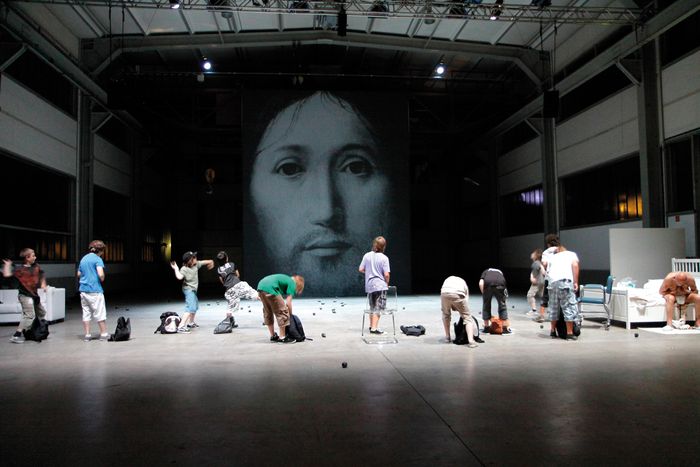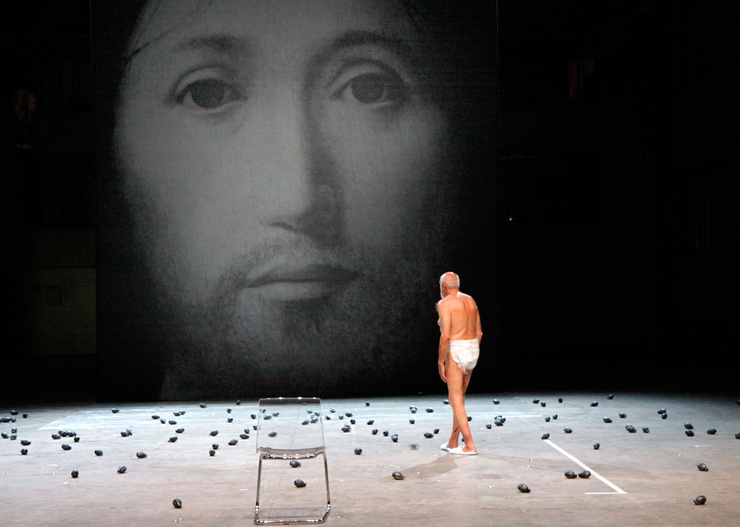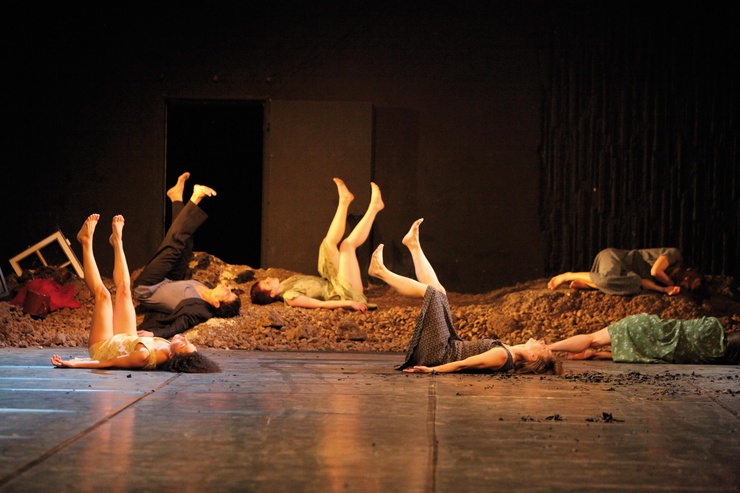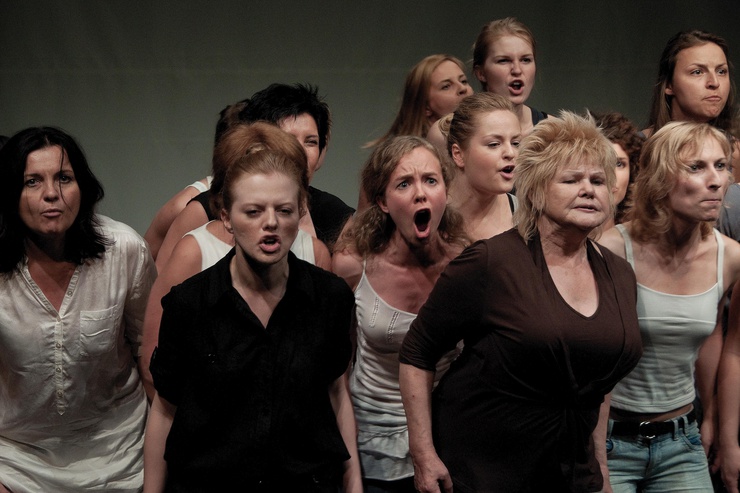
Review: Euro-scene Leipzig festival of contemporary theatre
Published on
Translation by:
Cafebabel ENG (NS)The festival in eastern Germany has been running every November for 22 years, with the 2012 edition symbolically being consecrated to the theme of a flower, ‘autumn crocus’
An old man passes stool in his clean underwear for the third time. His son once again tries to reassures his lamenting father, and proceeds to clean the brown stains which mark the ultra white decor of their flat. It smells suddenly of rotten egg. A huge image of Jesus Christ appears on the wall.

This is a scene from ‘On the Concept of the Face of the Son of God’ ('Sul concetto di volto nel figlio di Dio') by Romeo Castellucci, which opens the 2012 euro-scene international contemporary theatre festival tonight. Since it was first performed in 2010, the director and his company, la Socìetas Raffaello Sanzio, have had to deal with protesters from all over Europe; there have been tears and indignation, as well as disgust and rejection.
Disturb me
Ann-Elisabeth Wolff, director of the Leipzig theatre festival, says this play is right up her street. She wants audiences to be touched or disturbed with ‘her’ pieces; she wants contrasting debates and opinions. The amateurs of Castellucci’s theatre are used to performing in a ‘theatre of emotions’. At the end of the play, children throw bombs on to the portrait of Christ by Antonello da Messina (1465), but they don’t manage to destroy the image. It’s an expression the loss of hope of a generation which is prey to suffering and distress, in front of an unflinching Christ, the embodiment of god today: each person in the audience could and should interpret his ways in the images which spring up on stage.
Castelluci’s play is one of twelve showing at the festival, which opened in early November in Saxony. The week-long tradition of welcome pan-European playwrights first stimulated the local cultural economy in 1990. Ann-Elisabeth Wollf explains that the festival’s mission is not just to select innovative plays with unique writing, but also to be a crossroads between east and west Europe, to identify new trends and propose pertinent social themes. In 2012, dancers and actors participated from countries including Italy, Belgium, Lithuania, Slovenia and Kosovo.
Roma and dying flowers
Yue Medlin Yue from Prishtina blows us away with the authenticity that his six actors have on stage. The touching story is told through simple means and in a tragic-comic way: a Roma family who were deported from Germany at the end of the war in Kosovo are trying to resettle in the chaos of a new society which was created in 2008. The play follows the life of this family by linking it to different worlds. It shines a light on the current situation of Europe’s biggest minority, without pathos.

The theme of the festival in 2012 is ‘autumn crocus’ – a flower which is also referred to in English as meadow saffron or naked lady. As its name suggests, the flower only blooms in the autumn, whilst other plants are already dying. The homonymous play from the Bielefeld theatre, directed by choreographer Rainer Behr (of Pina Bausch’s Wuppertal dance theatre fame), thus has an apt dark atmosphere. By dancing around a pile of rubble, the troop discovers its frontiers and tries to overcome them. The references are not always clear; it’s more the facial expressions of the dancers which help you work out what’s going on onstage.The 25 women who comprise the female chorus from Warsaw come from different generations and thus mix up a series of styles. They are also unhappy and on the verge of exploding. This skewer of furious faces looking out at the audience feels very oppressive, but then they exchange recipes for different meals, which rather lightens the mood. 'The chorus speaking’ are impressive for their mix of voices, expressions and gestures, as well as their odd motley of musical styles.

Festival in its autumn too?
With a budget of 660, 000 euros and a staff of five people, the festival couldn’t be run without the help of a number of interns. Thanks to the meagre funding, nor is the euro-scene theatre festival of Leipzig is not able to offer national exclusives from big-name theatre companies. Its originality lies in its focus on a more oriental Europe, such as this year’s seven small production exclusives, including the play from Prishtina. This means that the festival won’t be attracting everyone in Germany. But for the people who live close to Leipzig, they’re treated to a little European theatrical breath of fresh air.

Director Ann-Elisabeth Wollf is to thank for this, since she has kept her original enthusiasm and tenacity. Whether a 2013 edition of the festival would take place initially looked shaky since BMW won’t be supporting the event any longer; it has supported the festival for eleven years, contributing a mighty portion of the small budget. The festival is held across a range of venues in Leipzig, including small theatres and random spots as well as the national opera hall. Some of the plays are even performed in the protestant church of Saint-Pierre, whose pastor is very tolerant. Without him it would almost be impossible to see a show like Sul concetto di volto nel figlio di Dio de Castelluci being screened in such a location, and scenes with old men emptying their bowels onto the floor, or bombs falling on the son of god.
Images: main Castellucci and in-text: Sul concetto di volto nel figlio di Dio by Socìetas Raffaello Sanzio © euro-scene/ Klaus Lefebvre; Bielefeld dance theatre 'Herbstzeitlose' © euro-scene / Ursula Kaufmann; women's chorus Poland/ 'Chór kobiet' © euro-scene/ Witold Meysztowicz/ video 'Herbstzeitlose' (cc) Theater Bielefeld/ youtube
Translated from euro-scene Leipzig: Theater-Drehscheibe zwischen Ost und West



